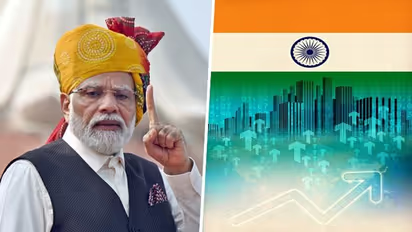Best economy and finance architecture: Nobel winner Michael Spence hails India's digital dominance

Synopsis
Spence lauded India's prowess in developing the world's best digital economy, emphasizing its openness and ability to provide inclusive services across vast territories. In a statement from the university, he highlighted India's exemplary digital and financial infrastructure, marking it as a global leader in the field.
Renowned economist A Michael Spence, a Nobel laureate in Economic Sciences, expressed admiration for India's remarkable achievements in the digital economy and finance sector. Speaking at Bennett University in Greater Noida, he acknowledged India as the major economy with the highest growth potential, commending its open, competitive, and inclusive digital architecture.
Spence lauded India's prowess in developing the world's best digital economy, emphasizing its openness and ability to provide inclusive services across vast territories. In a statement from the university, he highlighted India's exemplary digital and financial infrastructure, marking it as a global leader in the field.
Addressing the current global economic landscape, Spence underscored a transformative "regime change." He traced the breakdown of the 70-year-old global economic system, attributing it to factors such as pandemics, geopolitical tensions, and climate shocks. According to him, the world is witnessing a fundamental shift in the global economy, with the centre of gravity moving towards the East.
Spence emphasized the diversification of global supply chains as a response to a shock-prone world, noting that reliance on single sourcing is no longer viable. This shift brings about increased complexity in global governance, challenging the conventional economic criteria centered around efficiency and comparative advantage.
Despite the ongoing challenges, Spence expressed optimism regarding counter-measures that can enhance human welfare. He highlighted significant progress in science and technology, including generative AI, advancements in biomedical life sciences, and substantial energy transitions.
Indians conduct first UPI transactions in Sri Lanka, Mauritius (WATCH)
While acknowledging the potential benefits of technological growth, Spence also highlighted downsides, particularly the widespread availability of powerful scientific and technological tools. He stressed the need for responsible use, ensuring that these tools contribute to the well-being and opportunities for a broad spectrum of individuals.
Spence cited examples such as competitive pricing in solar energy and the significant reduction in the cost of DNA sequencing. He noted the positive impact of these advancements in contributing to human welfare and emphasized the need for responsible utilization.
Stay updated with all the latest Business News, including market trends, Share Market News, stock updates, taxation, IPOs, banking, finance, real estate, savings, and investments. Track daily Gold Price changes, updates on DA Hike, and the latest developments on the 8th Pay Commission. Get in-depth analysis, expert opinions, and real-time updates to make informed financial decisions. Download the Asianet News Official App from the Android Play Store and iPhone App Store to stay ahead in business.